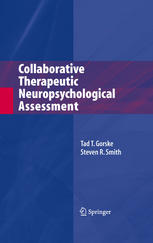

Most ebook files are in PDF format, so you can easily read them using various software such as Foxit Reader or directly on the Google Chrome browser.
Some ebook files are released by publishers in other formats such as .awz, .mobi, .epub, .fb2, etc. You may need to install specific software to read these formats on mobile/PC, such as Calibre.
Please read the tutorial at this link: https://ebookbell.com/faq
We offer FREE conversion to the popular formats you request; however, this may take some time. Therefore, right after payment, please email us, and we will try to provide the service as quickly as possible.
For some exceptional file formats or broken links (if any), please refrain from opening any disputes. Instead, email us first, and we will try to assist within a maximum of 6 hours.
EbookBell Team

4.1
50 reviewsCollaborative Therapeutic Neuropsychological Assessment
Edited by Tad T. Gorske, University of Pittsburgh, School of Medicine
Steven R. Smith, University of California at Santa Barbara
Perhaps the greatest challenge faced by neuropsychological assessment is its image as a bearer of bad news, i.e., the diagnosis of cognitive impairment. To meet this challenge and better address patient needs, practitioners need to fill the void that too often exists between diagnosis and treatment, starting with exchanging feedback about test results. The contributors to Collaborative Therapeutic Neuropsychological Assessment have developed methods that expand on traditional information-gathering means to build rapport with patients and let their voices be heard in decision-making: this client-centered approach has shown to lead to more personal interventions, better compliance, and stronger recovery.
In contrast with other books in the field, this reader-friendly volume provides detailed methods and procedures on client feedback as well as assessment, in addition to conceptual and practical basics:
The clinical knowledge presented in Collaborative Therapeutic Neuropsychological Assessment builds on the centrality of assessment in care to signal potent new directions in practice and training. As such, it deserves to be read by neuropsychologists (as well as rehabilitation, clinical, and school psychologists), and used in courses and certification programs in psychological and neuropsychological assessment.